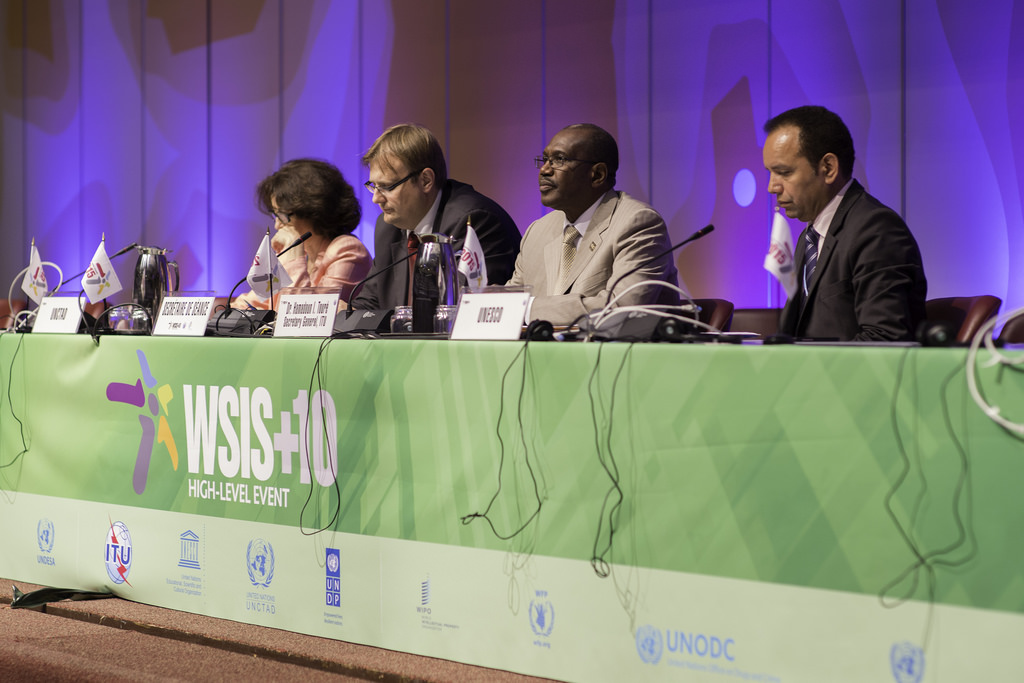
Meet WSIS+10

In addition to a core set of United Nations bodies we simulate, American Model United Nations also provides representatives an opportunity to explore the working of meetings and summits outside of the six major organs of the UN. In 2017, AMUN is simulating the 2015 General Assembly High Level Meeting on the World Summit on the Information Society (WSIS+10).
WSIS+10, held in 2015, reviewed progress since the initial World Summit on the Information Society. The original World Summit on the Information Society was actually two meetings hosted in in Geneva, Switzerland in 2003 and again in Tunis, Tunisia in 2005. At the turn of the century, the international community began to recognize the importance of information and communications technology (ICT) and the digital revolution for development, and with the Millennium Development Goals set in 2000, the utility of ICT towards achieving those Goals was appreciated. In 2001, The United Nations General Assembly, upon the recommendation of the International Telecommunications Union called for a pair of meetings to be held on the subject of the Information Society.
More than 11,000 representatives of 175 countries met in Geneva in 2003 to formalize the central tenets of the Information Society and initial plans on how to ensure that its benefits can be reaped by all. These talks culminated in two documents: the Geneva Declaration of Principles and the Geneva Plan of Action. The Declaration of Principles ends with a hopeful vision of the future: “We are firmly convinced that we are collectively entering a new era of enormous potential, that of the Information Society and expanded human communication.”
The final section of the Geneva Plan of Action suggested a starting point for the Tunis meeting, held two years later. The primary goals of this meeting were, among others, Internet governance, to determine financial mechanisms for bridging the digital divide—the gap in access to the Internet and ICT between developed and developing countries—and to discuss the implementation of the goals decided upon in the Geneva meeting. Internet governance proved to be particularly controversial, as at the time the main structure of the Internet was controlled by the US-based Internet Corporation for Assigned Names and Numbers (ICANN). As a result, the meeting proposed the creation of the Internet Governance Forum to act as an international-level forum for policy discussions related to Internet governance, while ICANN maintained its role in managing the Internet. This meeting also produced two sister documents: the Tunis Commitment, which reaffirmed the principles and decisions from Geneva, and the Tunis Agenda for the Information Society, which described the results of the talks, such as the aforementioned Internet Governance Forum. Additionally, the Tunis Agenda called upon the General Assembly to review the progress of the Agenda in 2015, in what would become WSIS+10.
The intervening ten years saw an amazing degree of progress in terms of the Information Society. Between 2005 and 2015, the percentage of people with access to the Internet across the globe almost tripled, and the total Internet traffic increased over 2500%. However, the problem of the digital divide persisted. In 2015, only 41% of the global population had Internet access, and approximately 80% of all online content was only available in English. Just as was seen in the Millennium Development Goals, much progress was made, with ever more left to accomplish.
WSIS+10 met over the course of 2015 with two goals: to assess the progress toward the goals from Geneva and Tunis and to set a plan looking forward for shaping the future of the information society. Just as was done in Geneva with the Millennium Development Goals, the vision of an Information Society for all was linked directly to the newly agreed-upon Sustainable Development Goals, reaffirming the codependence between ICT, the Information Society and development. After a year of discussions, the General Assembly agreed to a final document that, among other proposals, extended the mandate of the Internet Governance Forum, called upon States to increase efforts to fight cybercrime, and reiterated the importance of human rights online. These decisions will be evaluated at WSIS+20 in 2025.
Here at American Model United Nations, we are re-playing and seeking to further the debates that took place over the course of 2015 at WSIS+10. Many items were in consideration for the final document that didn’t make the cut: Should control of the Internet be divided amongst the States? What should be the United Nations’ stance on net neutrality? With the knowledge of the last two years at our disposal, the representatives have the opportunity to review answers to the questions posed to the real WSIS+10—answers that were chosen to appear in the final document, were discussed but ultimately decided against or were never considered—towards the goal of shaping the future Information Society for all.
Keep Up With The Accords
More to read
The AMUN Accords is a premier resource for fact-based Model United Nations simulations. We are always looking for new contributors. Want to write for the AMUN Accords? Check out out the submission guidelines and then get in touch!




